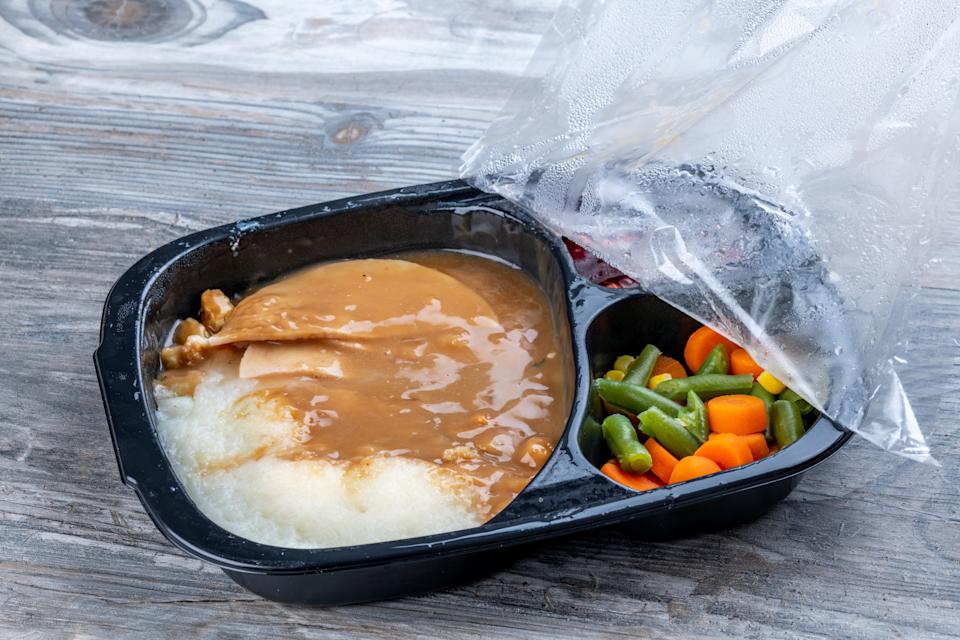Marks and Spencer has unveiled an easily recyclable paper fibre ready meal tray for tikka masala to replace the plastic containers.
The tray is made of renewable paper fibre and can be recycled as easily as paper without removing the thin plastic lining.
The move is part of Marks & Spencer’s ambitious plan to remove a billion units of plastic by 2028.
According to the government, England has seen recycling rates stall in the past 14 years meaning too much waste is dealt with through incineration or thrown in landfill. Almost half of all waste (49%) collected by local authorities in 2022/23 was incinerated, with just 40% recycled.
Part of the problem remains confusion among consumers. According to a survey by the Environmental Services Association (ESA) and British Plastics Federation (BPF) in March 2024, 70% of respondents said they would recycle more plastics if they were better informed on which plastics can be recycled at home.
For example, many consumers may be unaware that when they eat standard ready meals, the plastic container can be recycled, but the film attached to it can not.
This means that knowing what not to recycle can be just as important as knowing what can be recycled.
In fact, there are several very common types of plastic that many of us throw into the recycling without a second thought, and for which not only is there limited recycling in the UK, in some cases, there is no plan for them to ever become recyclable.
Here, Yahoo News looks at some of the most common plastics that the UK struggles to recycle.
‘Biodegradable’ and ‘compostable’ plastics
Compostable plastics are often used in takeaway containers, cutlery and coffee cups (Getty)
Biodegradable and compostable plastics sound like they are good news for the planet, but are not usually recycled in either kerbside collections or garden waste.
Most British councils do not recycle them, and they can contaminate recycling streams or reduce the quality of compost.
‘Compostable’ also does not mean they can be composted in normal gardens, and these plastics usually require an industrial composting facility.
Most ‘compostable’ plastics are usually sent to landfill or incinerated, as there is no UK-wide system for dealing with them.
In the UK, compostable plastics are often used in takeaway containers, cutlery and coffee cups as well as ‘compostable’ bags from retailers.
Biodegradable plastics are often used in ready-meal trays, wet wipes and food packaging.
Composite plastics
Plastics that have multiple layers, such as with aluminium and plastic, cannot be recycled. (Getty)
Composite plastics (i.e. plastics that have multiple layers, such as with aluminium and plastic in coffee bags) cannot be recycled in most places.
If there’s one shiny side to plastic and a dull side, it’s probably composite.
Some supermarkets and large retailers offer places where composite plastics, such as aluminium-lined crisp packets, can be recycled.
Otherwise, composites mostly end up being incinerated or in landfill.
Composite plastics are commonly used in food packaging, drinks cartons, coffee cups and flexible pouches, for example for pet food.
PVC
Sandwich on a plate being wrapped in cling film.
Polyvinyl chloride (PVC) is rarely recycled in the UK, despite being widely used in cooking oil bottles, cling film and clear food packaging.
Not all cling film uses PVC and some is recyclable, so it’s worth checking the packet.
PVC is not generally collected because it is difficult to process and carries a risk of contamination.
Globally, 82% of PVC waste ends up in landfill and 15% is incinerated, according to World Wildlife Fund research.
Polystyrene
Polystyrene is used in electronics packaging among other things (Getty)
Polystyrene and expanded polystyrene are used in takeaway food containers, meat trays and some egg cartons, as well as some electronics packaging.
Most councils in the UK do not recycle polystyrene, although some areas have collection bins where people can bring polystyrene to be recycled.
The problem is that polystyrene can cause contamination with other recyclable plastics.
But the government’s Simpler Recycling scheme aims to standardise collection rules, with councils forced to collect the same waste streams.
Experts hope that this means that plastics such as polystyrene can be recycled in future.
Plastic films and bags
Turkey and gravy TV dinner with vegetables
Plastic films commonly come attached to items such as ready meals, which can be recycled, but the film itself cannot.
Films are commonly made from Low-Density Polyethylene or a mixture of materials, and these are not commonly recycled due to a risk of contamination.
By 2027, the government aims to standardise household recycling so that films can be recycled.
